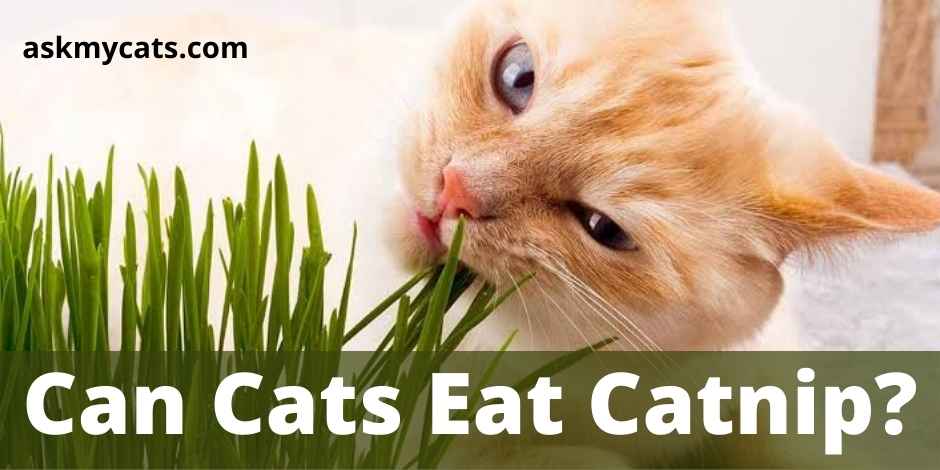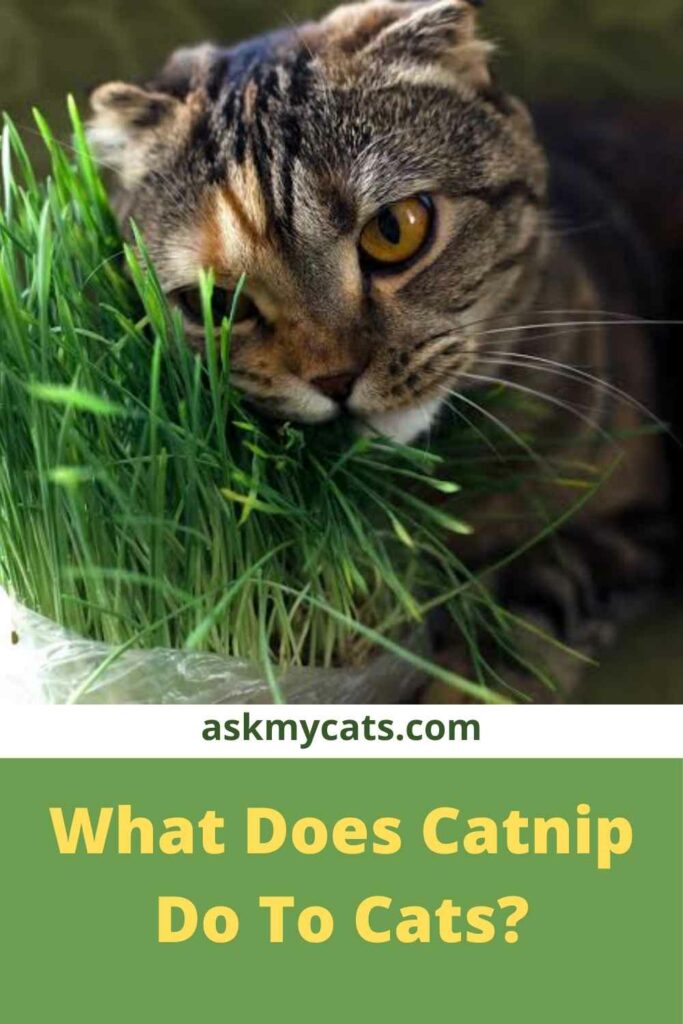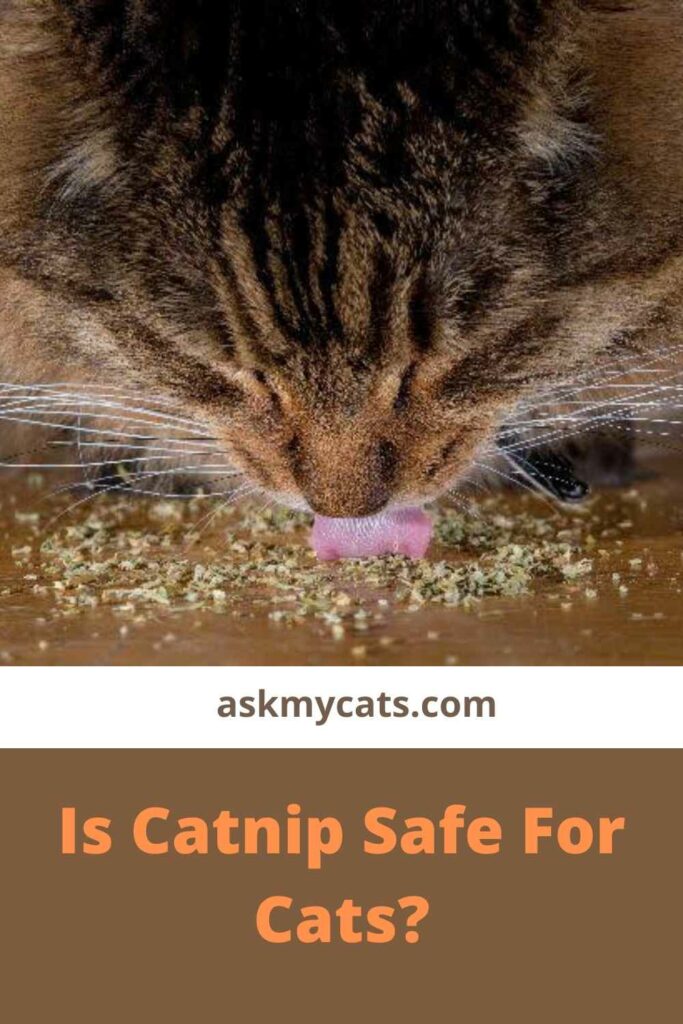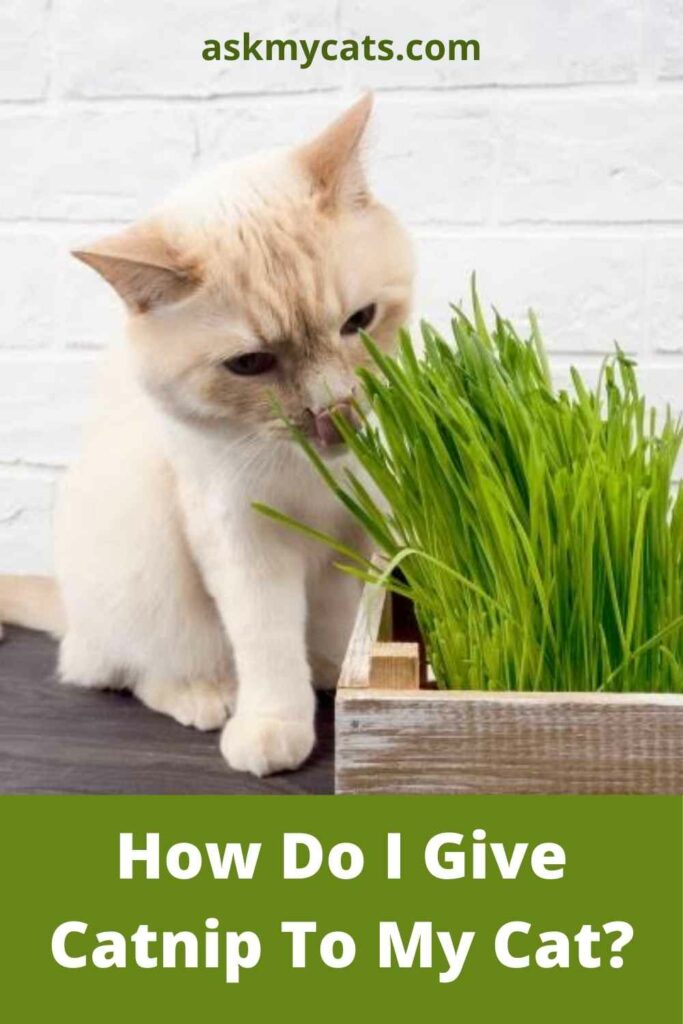Catnip, also known as Nepeta Cataria, is a common plant that belongs to the mint family. It’s a shrub with feathery, light-green leaves and lavender blooms that’s easy to cultivate in North America.
Catnip blossoms are supposed to cure coughs and the leaves have been used to create tea. It’s also a key component in several natural insect repellents.
Yes, catnip is completely safe to eat and does not have any addictive properties. However, you should be careful and allow your cat to eat catnip only in moderation.
Catnip is more of a herb than a meal, similar to parsley or oregano. Therefore, if your cat consumes too much of it, it could have an upset stomach.
If you want to learn more about your feline and their love for catnip, keep reading!


Give Your Cat the Perfect Day
Get the Free Ebook!
Do Cats Like Or Hate Catnip?
Though it’s a common misconception that all cats love catnip, this isn’t always the case. In reality, only around half of cats are enthralled by its alluring aroma. Other cats may show only a passing interest or none at all.
Before you go out and buy any to try, keep in mind that you won’t know if your cat likes catnip until they’re three to six months old. Their sensitivity to catnip doesn’t show up until they’re older.
It’s one thing for a cat to smell catnip on cat toys, it’s quite another to ingest catnip. Catnip serves as a moderate sedative when consumed by a cat. After eating some, you could see your cat enjoying a long cat nap.
Is Catnip Safe For Cats?
Catnip does not appear to be hazardous to cats or young kittens. However, if they consume a large amount of fresh or dry catnip leaves, they may have stomach discomfort, vomiting, or diarrhea.
Cats are adept at self-control and won’t overdo it if they accidentally get their hands on a catnip plant or a package of catnip.
It’s important to remember that, while catnip isn’t toxic, cats can be harmed while running about the room under its effect.
In any event, catnip should be given to your cat in moderation as a pleasant treat every now and then. Another reason to avoid using too much catnip is that it loses its impact after a while.
Catnip may be consumed by cats, and it may even be beneficial to their digestive system. The antidiarrheal effects of the catnip herb have been utilized in humans.
With that stated, it’s crucial to keep your cat from consuming excessive quantities of catnip, since this might create stomach problems.
Is Catnip Poisonous To Cats?
Cats who consume too much catnip may experience health issues such as vomiting, diarrhea, disorientation, or difficulty walking.
Use a small quantity at a time, and consult your veterinarian about the proper dosage for your cat.
Because fresh catnip is more powerful than dried catnip, you won’t have to feed your cat as much. Because of their strength, extremely concentrated catnip oils should be avoided.
We recommend that you be careful about the usage of catnip on your cat.
What Does Catnip Do To Cats?

In the roof of their mouth, cats have an extra smell organ called the vomeronasal gland. Smells gathered in the nose and mouth are transported to the brain via this unique route.
The oil contained in the leaves of the catnip plant, known as nepetalactone, has been shown to trigger behavioral changes in cats.
Catnip mimics feline sex hormones, thus cats who consume it exhibit behaviors that are similar to those of a female cat in heat. However, both male and female cats can experience the effects.
Overt displays of love, relaxation, and enjoyment are examples of these behaviors. Other cats will engage in active behaviors like playfulness or even aggressiveness.
Catnip can help reduce anxiety and possibly treat pain in cats that have had a favorable experience with it.
If your cat will be home alone for a lengthy amount of time, some doctors recommend administering catnip to aid with separation anxiety.
The active component in catnip does not affect all cats. According to veterinary research, around 60% of cats will exhibit a behavioral reaction to catnip.
There’s also evidence that a cat’s reaction to catnip is a genetically determined dominant characteristic.
Is Catnip Beneficial To Cats?

Catnip can come in helpful in a variety of situations. It may be used to get an elderly feline or a couch potato cat moving, for example.
All cats require regular exercise to maintain a healthy weight and avoid health issues such as joint discomfort and diabetes.
Catnip can also aid in the treatment of behavioral problems. Sprinkle a little catnip on the scratching posts and mats you’ve laid out if your cat is scratching the furniture but not going near them. That should pique their interest.
You may use the same technique to get your cat to check out a new comfortable pet bed that he doesn’t appear interested in.
You may also give your cat some fresh catnip to chew on before a stressful event. It works as a moderate sedative and can help you and your cat relax during anxiety-inducing activities.
Therefore, catnip is beneficial to your little feline friend in a number of ways. Give your cat a pinch of catnip every now and then to help her relax.
Interesting Read: Is Catnip Safe For Pregnant/Nursing Cats?
How Do I Give Catnip To My Cat?

Catnip comes in a variety of forms:
- Fresh Catnip that you can grow
- Dried Catnip
- Catnip sprays
- Catnip bubbles
- Toys filled with dried catnip
Catnip items are available in a wide range of shapes and sizes. Powdered catnip or catnip bulbs can be sprinkled on the ground or stuffed inside a toy. Some toys are already scented with catnip or contain catnip.
Catnip oil or oil spray, which may be used to fragrance a toy or bedding, is also available. Cats will respond to even very little quantities of catnip, so you won’t need much.
For cats that develop an upset stomach from eating catnip, sprays are an excellent choice. You could spray your cat’s favorite toy with it as it is safe to use.
You may also wrap a toy in dried catnip or sprinkle it on a cat tree, scratching post, or cardboard scratcher.
Does Catnip Make Cats High?
When cats are given catnip, they act ecstatically. Catnip generates a substance that stimulates their opioid reward systems,
Cats get high on catnip by breathing nepetalactone. This may be found in a fresh catnip plant, dried plant material, or oil extract.
The substance binds to receptors in a cat’s nose. This stimulates sensory neurons that lead to the brain which gives an effect of ‘high” in cats.
This appears to affect activity in multiple regions of the brain. This final region is important in controlling the animal’s emotions, among other things.
In most cats, nepetalactone causes a strong, inebriated state. Thus, your cat may get high due to catnip.
Frequently Asked Questions
Can Cats Ingest Catnip?
Catnip may be consumed by cats, and it may even be beneficial to their digestive system. The antidiarrheal effects of the catnip herb have been utilized in humans. With that stated, it’s crucial to keep your cat from consuming excessive quantities of catnip, since this might create stomach problems.
How Do I Feed My Cat Catnip?
Spray liquid catnip on a favorite toy or sprinkle dried leaves in locations you want your cat to be interested in. Cats are attracted to the fragrance and like rolling, chewing, and occasionally eating it.
Is Fresh Catnip Better Or Dried Catnip?
Fresh catnip has a higher potency than dried catnip. Keep in mind that a cat’s primary reaction to catnip is to smell it, not to taste it. You may need to smash or bruise the leaves before offering them to your cat to expose the oils inside the plant in order to elicit the same response from your cat.
Final Words
While catnip is a natural plant, we recommend keeping an eye on how much your kitty is really eating because cats have no nutritional need to eat plant materials. Moderation is essential in many situations.
But don’t get too worked up even if your cat manages to sneak in a few more secret catnip sessions as the result will almost certainly be vomiting it back up. However, if you see the negative symptoms persisting, even after a long time, visit a veterinarian.
If you have any more doubts regarding your feline friend’s eating habits, drop them in the comment section below!
